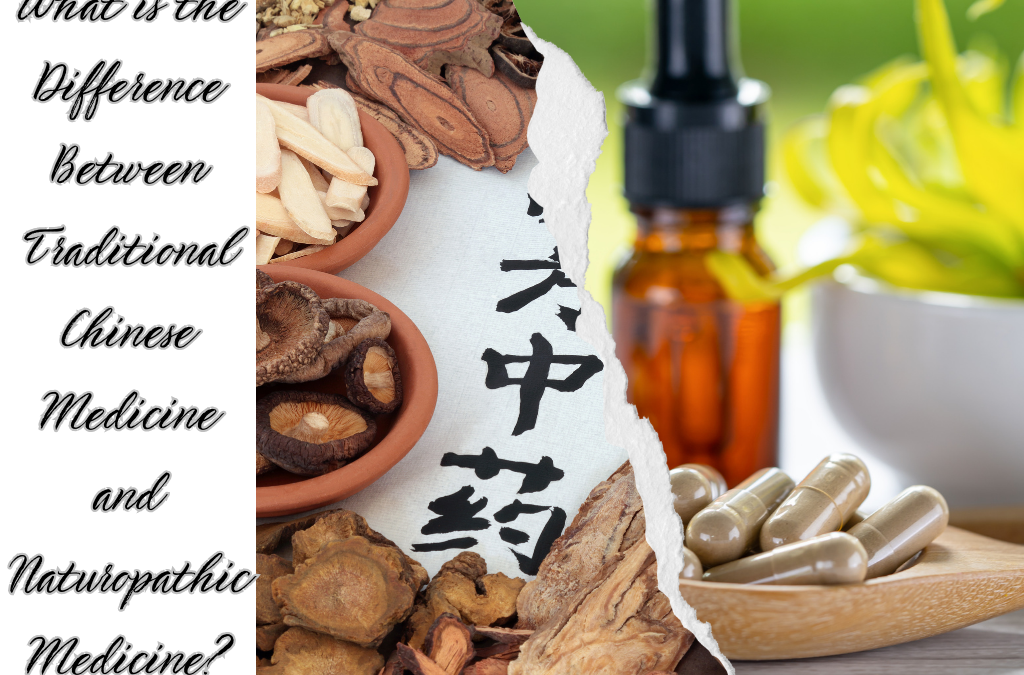As individuals seek alternative and natural ways to approach their health concerns, Traditional Chinese Medicine (TCM) and naturopathic medicine have emerged as popular options. These approaches emphasize natural therapies and the body’s innate ability to heal itself. However, with the increasing popularity of these practices, patients may wonder how TCM and naturopathic medicine differ and how they are regulated. This blog aims to provide an unbiased and informative comparison of TCM and naturopathic medicine, including their similarities, differences, and potential risks.
About Traditional Chinese Medicine and Naturopathic Medicine

Traditional Chinese Medicine (TCM)
TCM has been around for over 2,000 years. It includes acupuncture, herbal medicine, cupping, tui na (massage), and nutrition. The practice is based on the concept that Qi, or energy, flows through the body along meridian pathways. Practitioners believe Qi influences all aspects of a person’s health, and TCM seeks to balance it through various methods.
TCM is effective in treating chronic conditions such as pain, digestive issues, allergies, and emotional stress. However, researchers need to do more studies to evaluate its clinical effectiveness. Research shows that acupuncture, a popular TCM therapy, relieves pain and may have other benefits, such as improving sleep and reducing anxiety.
One of the challenges of TCM is the lack of standardized training and regulation. While China highly regulates TCM, it is still an emerging field in other parts of the world, and practitioners in these areas may have varying levels of education or training.

Naturopathy
Naturopathy is a holistic practice that emphasizes using natural remedies to support the body’s natural healing mechanisms. Naturopathic doctors assess patients’ entire health history, including physical, mental, and emotional health, and develop personalized treatment plans using a variety of natural therapies.
Naturopathy uses a combination of therapies such as botanical medicine, clinical nutrition, hydrotherapy, homeopathy, naturopathic manipulation, acupuncture, and lifestyle counselling to improve the patient’s overall health. It has been proven effective in treating chronic conditions such as high blood pressure, diabetes, and asthma, preventing disease, and promoting general wellness.
Canada highly regulates naturopathy and recognizes it as a distinct primary healthcare system. Naturopaths must undergo rigorous training and receive licensing to practice from a governing body.
Similarities and Differences Between Traditional Chinese Medicine and Naturopathic Medicine
TCM and naturopathic medicine share similarities in their approaches to treating health concerns. Both systems believe in the body’s ability to heal itself. They use natural therapies to promote health and prevent diseases from developing. Additionally, they both emphasize the importance of addressing the root causes of illness and health issues, not just the symptoms.
The main difference between TCM and naturopathy is their approach to healing. TCM seeks to balance the energy flow throughout the body. At the same time, naturopathy aims to support the body’s natural healing mechanisms using natural remedies.
TCM uses acupuncture and herbal medicine as its primary therapies, while naturopathy uses a variety of therapies.
Regulations of Traditional Chinese Medicine and Naturopathic Medicine
TCM and naturopathic medicine differ in how they are recognized and governed. TCM is not currently a regulated healthcare profession in Canada. However, some provinces have associations that set voluntary standards of practice. The College of Traditional Chinese Medicine Practitioners & Acupuncturists of British Columbia governs TCMs in British Columbia.
The government regulates Naturopathic medicine in several Canadian provinces, including British Columbia, Alberta, Saskatchewan, Manitoba, Ontario, and Northwest Territory. These regulations ensure patients’ safety regarding practitioners’ training, education, and professional standards. Naturopaths in regulated provinces can prescribe designated drugs if they have completed a course approved by the College relating to drug prescription.

Potential Risks of Traditional Chinese Medicine and Naturopathic Medicine
While TCM and naturopathic medicine are typically practical and safe, there are potential risks associated with these practices.
TCM risks include minor side effects from herbs or acupuncture, as well as the possibility of misdiagnosis or improper treatment by an unlicensed or unqualified practitioner. Naturopathic medicine risks may include allergic reactions to supplements or botanical products or the chance of adverse interactions between prescribed medications and natural treatments.
Efficacy of Traditional Chinese Medicine and Naturopathic Medicine
The efficacy of TCM and naturopathic medicine is an area of ongoing research and debate. Many studies have shown positive outcomes for both practices in treating various health concerns.
Conclusion
Alternative medicine provides patients with an array of treatments that support the body’s natural healing processes. People have used TCM and naturopathic medicine for centuries. Although both systems share similarities, they also have differences in their diagnostic and treatment approaches. These differences give patients options, allowing them to choose a treatment that matches their unique needs. Patients considering these approaches should seek qualified and licensed practitioners and be aware of potential risks associated with these practices.
If you have questions or want to find out which is right for you, book a free TCM consultation with Gloria or a Naturopath consultation with Dr. Cerf.
Written by: DeVera Nybo, MBA, CEO/Owner, Newleaf Total Wellness Centre

